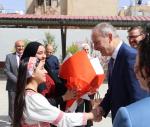You are here
Keeping Iraq from disintegrating
May 03,2016 - Last updated at May 03,2016
Iraq’s political system is on the verge of collapse and the events of the past few days raised serious questions about the viability of the state amid the popular backlash that has crippled the government and divided lawmakers.
Leading the rebellion is Muqtada Al Sadr, an unpredictable Shiite cleric who has played a controversial role in Iraqi politics since the Anglo-American invasion of his country in 2003.
Sadr, whose hostility to the Americans led to bloody confrontations in the past, relies mainly on the strong support of poor Shiites in Baghdad and elsewhere.
His family was victimised by former dictator Saddam Hussein and in recent years he has distanced himself from the pro-Iran Al Dawa Party, led by Nouri Al Maliki and a main player in the largest coalition in parliament.
For weeks now, Sadr has been leading a popular movement to accelerate political reforms, promised by Prime Minister Haider Al Abadi, also a leading member of Al Dawa Party.
Sadr’s main demand is to end the political quota system, which has divided the country, alienated the Sunnis and allowed massive corruption to spread.
Abadi now finds himself cornered between Maliki, who continues to call the shots behind the scenes and would prefer to maintain the status quo, and the popular force of Sadr, who has withdrawn his ministers from the Cabinet and triggered a rebellion inside the legislature.
One thing Sadr succeeded in doing, whether intentionally or not, is to unravel the Shiite coalition and change the principles of the political game in Baghdad’s Green Zone.
On Saturday, his supporters, joined by others who agree with his demands, broke into the Green Zone and stormed the parliament, chanting anti-Iranian slogans.
They later withdrew, but not before Sadr issued an ultimatum to the three branches of government to elect a new Cabinet of technocrats as soon as possible or face dismissal and civil mutiny.
One thing is certain: his unpredictability and the growing support for his cause have put Iraq’s traditional players on the defensive.
Parliament Speaker Sleim Al Jbouri, who faces an internal dissent by deputies, warned that the state will have to undergo total restructuring or face collapse. He is running out of time.
Abadi, on the other hand, continues to enjoy Sadr’s support, but he is careful not to sacrifice what remains of his political capital, for fear of losing his battle with Maliki for Al Dawa leadership.
The current crisis has dampened military efforts to recapture areas under Daesh’s control.
The Americans reiterated their support to Abadi, but they know that their influence over the political process in Iraq is waning.
So far, Sadr’s movement has sidelined the role of Tehran and Washington in the Green Zone, but that will not last for long. Perhaps this is why Sadr flew to Tehran on Monday to consult with Iran’s leaders on how to end the stalemate.
Rebuffed by the Iranians and their Iraqi allies in the past, he now wants to prove his political credentials.
And if the Shiite alliance has been rattled by Sadr’s daring moves, the Sunni coalition is not doing better either.
Recent events divided Sunni deputies, with some siding with Maliki and others with the Sadrist movement.
The only cohesive group, so far, is that of the Kurds, who have gained the most from the delicate balance of power in the current political structure.
Sadr is an opportunist riding a popular wave of resentment by the majority of Iraqis who are fed up with a system that has usurped the country’s wealth, created a corrupt political class and failed to improve the lot of citizens.
His call to do away with political quotas is being welcomed by both Shiites and Sunnis. But to move beyond the current stalemate there is need of leadership, something that is lacking in today’s Iraq.
In addition to that, any attempt at launching a national dialogue among political, ethnic and sectarian components requires that Tehran and Washington step aside and allow the Iraqi people to determine the best way forward.
Such scenario is unlikely to happen. Sectarian politics will continue to pit Iraqis against each other. This benefits Iran, which wants to keep Iraq under its control.
The current crisis has stunned key players in Iraqi politics who are yet to declare their position on the reform path. These include Abadi, Jbouri, Ammar Al Hakim, Osama Al Nujeifi, Saleh Al Mutlaq and Iyad Alawi.
Unless they abandon delicate political calculations, the policy of entrenchment and behind-the-scene bargaining, and come out to address the core of Iraq’s existential challenges, the crisis will deepen.
Time is running out and it might be too late to stop Iraq from disintegrating. Already Daesh is using the current political paralysis to spread death and destruction.
Sadr may carry out his threats and topple the country’s leadership, but that could also spell the end of the country as we know it.
The writer is a journalist and political commentator based in Amman.












